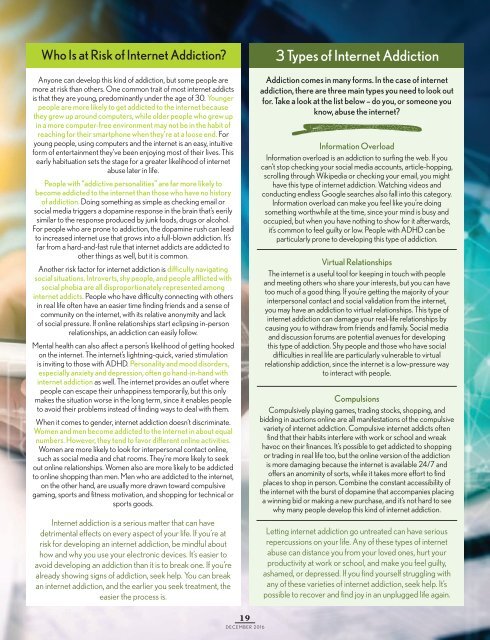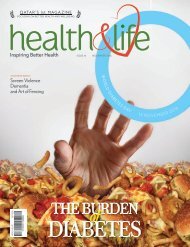December 2016 Health & Life Magazine
December 2016 Health & Life Magazine
December 2016 Health & Life Magazine
You also want an ePaper? Increase the reach of your titles
YUMPU automatically turns print PDFs into web optimized ePapers that Google loves.
Who Is at Risk of Internet Addiction?<br />
Anyone can develop this kind of addiction, but some people are<br />
more at risk than others. One common trait of most internet addicts<br />
is that they are young, predominantly under the age of 30. Younger<br />
people are more likely to get addicted to the internet because<br />
they grew up around computers, while older people who grew up<br />
in a more computer-free environment may not be in the habit of<br />
reaching for their smartphone when they’re at a loose end. For<br />
young people, using computers and the internet is an easy, intuitive<br />
form of entertainment they’ve been enjoying most of their lives. This<br />
early habituation sets the stage for a greater likelihood of internet<br />
abuse later in life.<br />
People with “addictive personalities” are far more likely to<br />
become addicted to the internet than those who have no history<br />
of addiction. Doing something as simple as checking email or<br />
social media triggers a dopamine response in the brain that’s eerily<br />
similar to the response produced by junk foods, drugs or alcohol.<br />
For people who are prone to addiction, the dopamine rush can lead<br />
to increased internet use that grows into a full-blown addiction. It’s<br />
far from a hard-and-fast rule that internet addicts are addicted to<br />
other things as well, but it is common.<br />
Another risk factor for internet addiction is difficulty navigating<br />
social situations. Introverts, shy people, and people afflicted with<br />
social phobia are all disproportionately represented among<br />
internet addicts. People who have difficulty connecting with others<br />
in real life often have an easier time finding friends and a sense of<br />
community on the internet, with its relative anonymity and lack<br />
of social pressure. If online relationships start eclipsing in-person<br />
relationships, an addiction can easily follow.<br />
Mental health can also affect a person’s likelihood of getting hooked<br />
on the internet. The internet’s lightning-quick, varied stimulation<br />
is inviting to those with ADHD. Personality and mood disorders,<br />
especially anxiety and depression, often go hand-in-hand with<br />
internet addiction as well. The internet provides an outlet where<br />
people can escape their unhappiness temporarily, but this only<br />
makes the situation worse in the long term, since it enables people<br />
to avoid their problems instead of finding ways to deal with them.<br />
When it comes to gender, internet addiction doesn’t discriminate.<br />
Women and men become addicted to the internet in about equal<br />
numbers. However, they tend to favor different online activities.<br />
Women are more likely to look for interpersonal contact online,<br />
such as social media and chat rooms. They’re more likely to seek<br />
out online relationships. Women also are more likely to be addicted<br />
to online shopping than men. Men who are addicted to the internet,<br />
on the other hand, are usually more drawn toward compulsive<br />
gaming, sports and fitness motivation, and shopping for technical or<br />
sports goods.<br />
Internet addiction is a serious matter that can have<br />
detrimental effects on every aspect of your life. If you’re at<br />
risk for developing an internet addiction, be mindful about<br />
how and why you use your electronic devices. It’s easier to<br />
avoid developing an addiction than it is to break one. If you’re<br />
already showing signs of addiction, seek help. You can break<br />
an internet addiction, and the earlier you seek treatment, the<br />
easier the process is.<br />
3 Types of Internet Addiction<br />
Addiction comes in many forms. In the case of internet<br />
addiction, there are three main types you need to look out<br />
for. Take a look at the list below – do you, or someone you<br />
know, abuse the internet?<br />
Information Overload<br />
Information overload is an addiction to surfing the web. If you<br />
can’t stop checking your social media accounts, article-hopping,<br />
scrolling through Wikipedia or checking your email, you might<br />
have this type of internet addiction. Watching videos and<br />
conducting endless Google searches also fall into this category.<br />
Information overload can make you feel like you’re doing<br />
something worthwhile at the time, since your mind is busy and<br />
occupied, but when you have nothing to show for it afterwards,<br />
it’s common to feel guilty or low. People with ADHD can be<br />
particularly prone to developing this type of addiction.<br />
Virtual Relationships<br />
The internet is a useful tool for keeping in touch with people<br />
and meeting others who share your interests, but you can have<br />
too much of a good thing. If you’re getting the majority of your<br />
interpersonal contact and social validation from the internet,<br />
you may have an addiction to virtual relationships. This type of<br />
internet addiction can damage your real-life relationships by<br />
causing you to withdraw from friends and family. Social media<br />
and discussion forums are potential avenues for developing<br />
this type of addiction. Shy people and those who have social<br />
difficulties in real life are particularly vulnerable to virtual<br />
relationship addiction, since the internet is a low-pressure way<br />
to interact with people.<br />
Compulsions<br />
Compulsively playing games, trading stocks, shopping, and<br />
bidding in auctions online are all manifestations of the compulsive<br />
variety of internet addiction. Compulsive internet addicts often<br />
find that their habits interfere with work or school and wreak<br />
havoc on their finances. It’s possible to get addicted to shopping<br />
or trading in real life too, but the online version of the addiction<br />
is more damaging because the internet is available 24/7 and<br />
offers an anominity of sorts, while it takes more effort to find<br />
places to shop in person. Combine the constant accessibility of<br />
the internet with the burst of dopamine that accompanies placing<br />
a winning bid or making a new purchase, and it’s not hard to see<br />
why many people develop this kind of internet addiction.<br />
Letting internet addiction go untreated can have serious<br />
repercussions on your life. Any of these types of internet<br />
abuse can distance you from your loved ones, hurt your<br />
productivity at work or school, and make you feel guilty,<br />
ashamed, or depressed. If you find yourself struggling with<br />
any of these varieties of internet addiction, seek help. It’s<br />
possible to recover and find joy in an unplugged life again.<br />
19<br />
DECEMBER <strong>2016</strong>
















